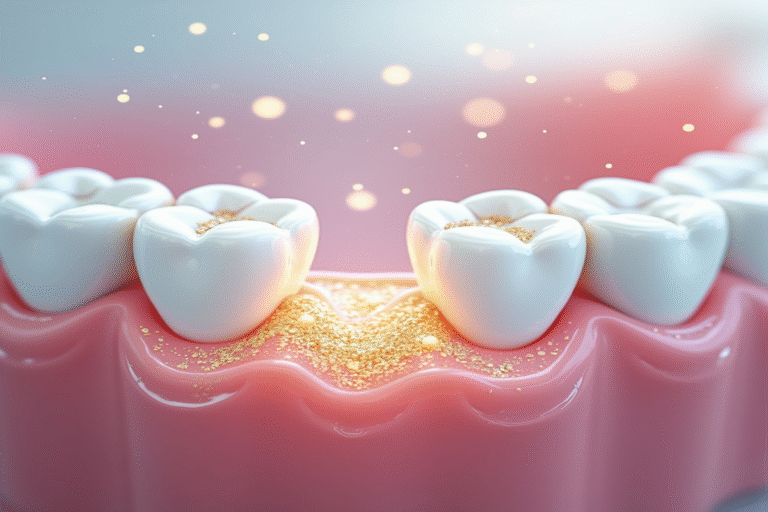Right now, inside your mouth, a microscopic battle is taking place between the forces that damage your teeth and those that repair them. Every sip of coffee and every bite of food triggers a series of chemical reactions that can either strengthen or weaken your teeth. But here’s the fascinating part: your body has an ingenious self-repair system that most people know nothing about.
Your saliva: More than just moisture
What many people consider simply the liquid that helps us swallow is actually a sophisticated chemical cocktail. Saliva contains a remarkable array of minerals—primarily calcium and phosphate ions—that serve as the building blocks for dental repair. These minerals exist in a supersaturated state, ready to be deposited exactly where needed on your tooth surfaces.
Dr. Athena Papas, co-head of geriatric dentistry at Tufts University School of Dental Medicine, explains: “Saliva is nature’s perfect protective mechanism for teeth. It’s constantly bathing our teeth in minerals that can heal microscopic damage before it becomes permanent.”
The daily cycle of damage and repair
Every time you eat or drink something acidic—which includes everything from citrus fruits to sodas and even some healthy foods—your mouth becomes temporarily more acidic. This drop in pH causes minerals to leach out of your tooth enamel, a process called demineralization.
When the acid attack subsides, saliva goes to work neutralizing the acids and initiating the remineralization process. The calcium and phosphate ions in your saliva are attracted to the microscopic damaged areas on your teeth, where they form new crystals of hydroxyapatite—the mineral that makes up 97% of tooth enamel.
This cycle happens constantly throughout your day:
- Eat or drink → pH drops → minerals leave tooth surface
- Saliva neutralizes acids → minerals return to tooth surface
The microscopic crystal factory
What’s truly remarkable is the precision of this repair system. Your saliva doesn’t just randomly deposit minerals everywhere—it targets the specific areas that have been damaged. Specialized proteins in your saliva act as scaffolding, organizing the calcium and phosphate ions into the precise crystalline structure needed to repair enamel.
Under a powerful electron microscope, you would see countless tiny hydroxyapatite crystals—each shaped like a microscopic hexagonal rod—growing and interlocking to form a structure that’s both beautiful and incredibly strong.
The fluoride factor: Nature’s repair booster
When fluoride ions are present (from drinking water, toothpaste, or other dental products), they dramatically enhance this natural repair process. Fluoride ions can replace the hydroxyl component in hydroxyapatite, creating fluorapatite crystals that are more resistant to acid attacks than the original tooth mineral. This is why fluoride has been called “nature’s cavity fighter.”
Perhaps most impressively, fluoride accelerates the remineralization process, allowing your teeth to repair themselves faster than they would naturally. It’s like providing your body’s repair crew with power tools instead of hand tools.
The delicate balance
The health of your teeth depends on a delicate balance between demineralization and remineralization. When the scales tip too far toward damage—due to frequent snacking, acidic drinks, dry mouth conditions, or poor oral hygiene—cavities can form.
Researchers at the University of California have found that saliva from different individuals varies in its remineralizing potential. Some people are naturally better protected than others, which helps explain why some people are more cavity-prone despite similar habits.
Supporting your natural healing system
Understanding this remarkable self-repair mechanism gives us insights into how to best support our oral health:
Giving your saliva time to work between acid exposures means limiting snacking frequency. Each time you eat, the remineralization process needs about 20–30 minutes to effectively counteract the acid attack. Constant snacking disrupts this natural repair cycle.
Staying well-hydrated ensures optimal saliva production. Chewing sugar-free gum can stimulate saliva flow, providing a natural boost to your repair system after meals when it’s most needed.
A miracle happening in your mouth right now
The next time you run your tongue across your teeth, remember that you’re feeling the results of a continuous healing process that’s been perfected over millions of years of evolution. Your body is quietly working to maintain your smile, using the humble but powerful minerals in your saliva to keep your teeth strong.
This invisible, automatic repair system is just one of the countless ways your body demonstrates its remarkable capacity for self-maintenance—an everyday reminder of the magic happening inside all of us, with every swallow, every smile, and every bite.





